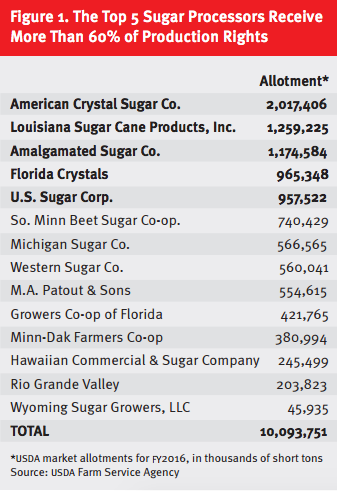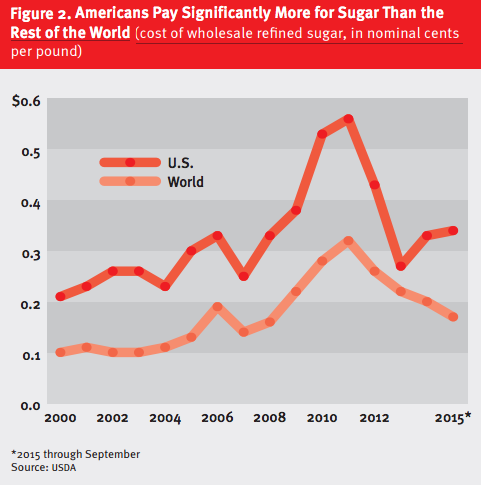Marco Rubio's Sweet Protectionism
The 2016 hopeful gives the feds cover to keep propping up Big Sugar.
Imagine you own a business that sells an unprofitable product. But you've done me favors in the past and I expect you to do me more in the future, so I decide to lend you the money your business needs to stay in operation. Should you find that you can't pay me back, you needn't worry, I'll take a massive shipment of your unprofitable product instead. Of course, I'd rather not deal with that headache, so I go to great lengths to make sure that your lower-cost competition is at a disadvantage, thus ensuring a market price for your product that will be sufficient to repay my loan.
Heads you win, tails you win!
It may sound crazy, but that's exactly what the Department of Agriculture (USDA) does to protect a politically powerful cartel of domestic sugar processing companies. It is a mind-numbingly complex arrangement that would have made a Soviet central planner blush. But the sugar lobby has successfully bought off enough politicians to keep the gravy train rolling for decades. Its latest defender: Republican presidential aspirant Marco Rubio.
Here's how the sugar racket works: The federal government offers loans to sugar cane and beet sugar processors, who in turn agree to pay sugar growers a minimum price set by the USDA. The goal is for processors to obtain a market price for their sugar that is sufficient to pay back the loan. But because the loans are "non-recourse," if the market price for sugar drops, processors can instead forfeit to the USDA the sugar they put up as collateral.
To prevent sugar processors from offloading sugar onto the USDA—and to shelter the processors from lower-cost foreign competition, further ensuring they'll receive an artificially inflated price—the federal government imposes a two-tier system of tariff rate quotas that serve as a sugar import barrier.
It also restricts the total amount of sugar that domestic processors can sell by setting "marketing allotments." These too are intended to drive up the price by creating an artificial scarcity. According to law, each year the USDA sets the overall amount of sugar that can be processed for domestic sale at "not less than 85 percent of the estimated quantity of sugar for domestic human consumption for the crop year." As Figure 1 shows, a cartel of 14 processors share the allotment, with the top 5 receiving 63 percent of the total for Fiscal Year 2016.

According to the Center for Responsive Politics, Big Sugar spends an average of $6 million a year lobbying Congress to maintain this sweet setup. The Fanjul family, whose sugar empire includes the company Florida Crystals, spent over $1 million last year alone lobbying politicians on both sides of the aisle to make sure they remain some of the wealthiest folks on the planet. Bill Clinton spent 20 minutes on the phone talking to Alfonso "Alfy" Fanjul while meeting in the Oval Office with a now-famous former White House intern named Monica Lewinsky.
What do the government's sugar policies mean for the rest of us? For starters, U.S. consumers have been paying, on average, twice as much for refined sugar as the rest of the world. As you can see in Figure 2, this costs Americans anywhere from $3 billion to $4.5 billion every year.
Big sugar defends itself by pointing to the number of jobs allegedly "saved" by their sweetheart deal. This ignores the harm to the companies that use the now more-expensive sugar, and to the Americans who work for them. According to the Coalition for Sugar Reform—a diverse group consisting of sugar-utilizing industries, think tanks, and activists with environmental concerns—businesses that buy sugar employ more than 30 times as many people as sugar farmers and processors do. The candy industry is a good example. Many confectionery companies, including Brach's and Hershey's, have relocated some of their operations to foreign countries, in part because of government-inflated sugar prices here in the United States.
The good news is there are signs that Big Sugar might no longer be as invincible as it once seemed. The ill effects of cronyist federal policies are often hard to measure. But with the federal sugar racket, the damage to America's economy and workforce is unusually clear, and thus is increasingly hard for politicians to ignore. A couple of years ago, a Senate amendment to the farm bill that would have phased out federal welfare for the sugar industry was defeated on a 46-50 vote. Disappointing, but at least the outcome was close.

One of the senators who voted to protect Big Sugar? None other than the Florida Republican Marco Rubio, whose long-standing political patron is Jose "Pepe" Fanjul—brother to the aforementioned Alfy. Pressed in August on his support for federal sugar protectionism, Rubio offered a tortured excuse that would be downright hilarious if the policy's consequences weren't so dire. According to Rubio, the U.S. can't scrap its support for Big Sugar because "other countries will capture the market share, our agricultural capacity will be developed into real estate, you know, housing and so forth, and then we lose the capacity to produce our own food, at which point we're at the mercy of a foreign country for food security."
Horrors! Maybe that's why Rubio's been calling for a $1 trillion U.S. military. If any insidious sugar-producing countries like Brazil ever refused to sell us their cheap sweetness, he could use it to force their hands.
This article originally appeared in print under the headline "Marco Rubio's Sweet Protectionism."


Show Comments (7)